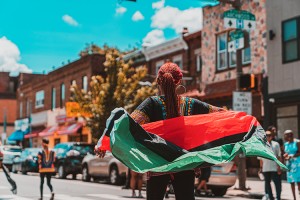Juneteenth 2020

A woman carries the Pan-African flag, a symbol of black unity, at a Juneteenth parade in Philadelphia, Pennsylvania. Juneteenth celebrations commemorate the freeing of slaves in Galveston, Texas, on June 19, 1865.
Credit: © Tippman98x/Shutterstock
June 19 is Juneteenth, a festival held in many African American and other communities to commemorate the end of slavery in the United States. The name of the festival refers to the date, June 19—the day the last slaves were freed in the southern state of Texas in 1865. Juneteenth festivities often include plays and storytelling, parades, prayer services, and family reunions. Some communities hold longer Juneteenth festivals spanning several days as a celebration of civil rights and freedom.
However, this year’s Juneteenth looks different than celebrations past. The holiday is set against the backdrop of a pandemic (global outbreak) of the coronavirus disease COVID-19. Since March, much of the country has been under strict lockdown to help in social distancing. Many businesses and public places are only beginning to reopen. The celebration also takes added significance in the wake of protests against racism and the police use of force against African Americans, sparked by the killing of George Floyd and others.
Several museums and cultural centers are having virtual (online) Juneteenth celebrations. There will also be virtual film and music festivals. Another way to celebrate Juneteenth is to support such black-owned businesses as stores and restaurants—but be sure to follow social distancing guidelines to help keep everyone safe!
Juneteenth originated in Texas at the end of the American Civil War (1861-1865). In 1863, President Abraham Lincoln issued the Emancipation Proclamation, which declared freedom for the slaves in Confederate states in rebellion against the Union. However, many slave owners in Texas suppressed information about the emancipation even after the war ended in April 1865. On June 19, Gordon Granger, a Union general, entered Galveston, Texas, and ordered all slaves in the state to be freed. About 250,000 people, among the last slaves remaining in the United States, were freed.
Juneteenth celebrations were held only in Texas and a few communities in other southern states in the years following the Civil War. African Americans carried the celebration with them, however, as they migrated to other regions of the country.


